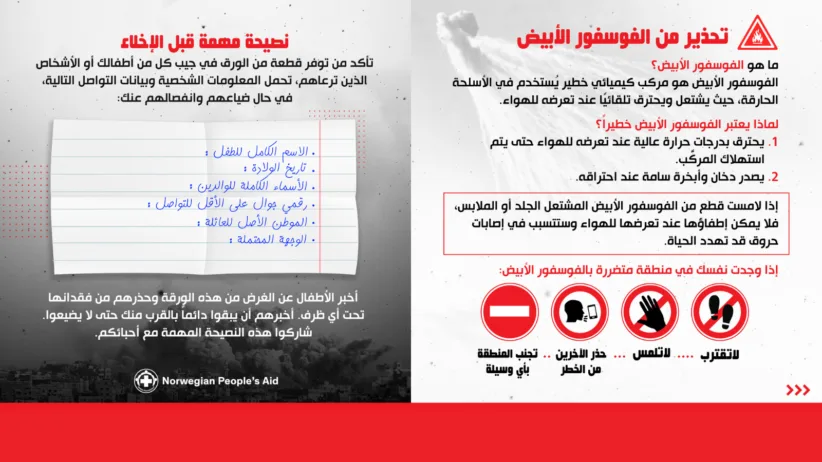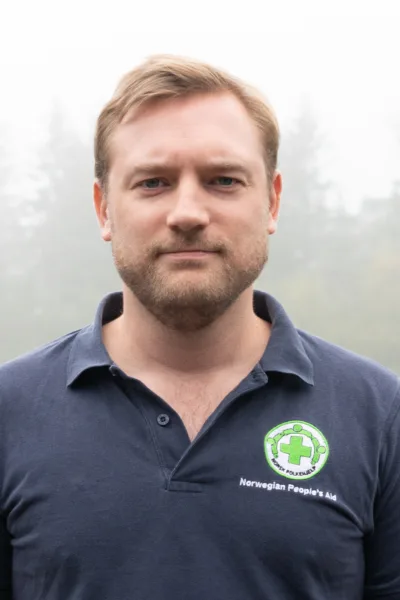The vital training continues
Usually, their job is to teach the people of Gaza preparedness and protection during bombings. Now, they have their hands full staying alive. In the meantime, Norwegian People's Aid uses social media to offer Gaza's civilian population a small fraction of security. The response has been tremendous.

17 December 2023
Since October 8, we've reached nearly two million Palestinians on Facebook and Instagram, and had a whopping 25 million views on our posts. We have never been close to anything like this in previous campaigns, says head of NPA's programme for Conflict Preparedness and Protection (CPP), Colin Bent.
The CPP programme first saw the light of day in the wake of the Gaza war in 2014. It came in response to the fact that it would not be the last time the Gaza Strip was bombed, and that the population needed better protection.
"As an emergency response organisation with expertise in weapons, we decided that one of the most important things we could do to assist the civilian population was to teach them how to protect themselves and their families from explosive weapons, and what steps they can take to increase their own preparedness," Bent explains.
Since then, NPA has conducted CPP training in war-affected countries such as Yemen, Ukraine, Syria and Myanmar. Over the years, organisations such as UNICEF and the UN demining organisation UNMAS have also initiated CPP activities.
Since the war in Gaza broke out, all physical CPP activities in Palestine have been paused. Instead, the program has set up a social media campaign. Humanitarian actors working on weapons issues have worked closely together to design and disseminate information about weapons risks and safe behaviour.
"Among other things, we have issued warnings about white phosphorus, a type of incendiary weapon that is toxic to breathe in and causes life-threatening burns when it comes into contact with the skin. Under international conventions, it is illegal to release white phosphorus from the air, and it is disturbing that the Israel Defense Forces (IDF) has spread it in the port of Gaza," Bent said.
Another controversial weapon that has not been confirmed to have been used, but where the evidence according to Bent is quite strong, is thermobaric bombs. These consist of an explosive charge that disperses and then ignites gas in the air. The resulting pressure wave is very powerful and deadly.
An unprecedented war
When the war hit on 7 October, Colin Bent was on a business trip to South Sudan to investigate the possibility of setting up a CPP programme.
"I became aware that Hamas had carried out a terrorist attack just before bedtime, and woke up to an intense exchange of messages on Whatsapp in the night. We were all appalled by the brutality of the attacks, and my Palestinian colleagues were understandably very concerned about how strong the retaliation would be.
All NPA's staff in Gaza have experienced war before, but the Israeli retaliation did not compare to anything they have ever seen before. They are all trained in CPP, two of them are themselves CPP trainers, so there was no shortage of knowledge on how to survive.
"However, the brutality of the bombing was so extreme that they were forced to flee in haste. Several of them received a text message or a phone call from the Israel Defense Forces saying they had a certain number of minutes to evacuate before their home would be bombed, Bent said.
Now all the employees are in Khan Younis, in southern Gaza. Although Israel has defined it as safer for civilians to stay here than in the north, intense bombing raids are also taking place here. Most of the NPA staff lack family and networks in the south, and only have the clothes they stood and walked in and the few belongings they managed to bring with them when they had to flee.

"It is painful to think that good colleagues and their families, with whom I have had dinner at home many times, live in such undignified conditions. I know that many of them are starving, and that every day is a struggle to meet basic needs," he says.
Everything is gone
As an added burden for those who have fled comes the concern for houses and homes that they have left. Before the ceasefire came into force on 24 November, half of all homes in Gaza had been destroyed to a greater or lesser extent by war.
Bent says that at an early stage of the war, one of the employees was told that his block had been bombed. To all intents and purposes, the missile had failed to detonate, and was left in the building like a ticking time bomb. However, the chance that there is capacity to remove a large, unexploded ordnance from a building is low, as it is far too risky to carry out clean-up operations in Gaza now. It is far more likely that the IDF will bomb again to complete the mission.
"What's sad about this particular story is that the entire extended family lived together in different apartments in the building. They had invested everything they had to be able to live together in this way. Now all of the assets that the family has worked up over several generations have probably been torn away, he said.
Norwegian People's Aid is one of the few organisations in Palestine with its head office and primary operations in Gaza. This has been a major advantage in previous crises, when it is rigged to respond quickly. Now that all employees have had to evacuate, this situation has been turned upside down.
"An advantage for those of us who work in the CPP programme is that more of us are sitting elsewhere in the world. This applies to both myself and the graphic designer who is responsible for designing all communication materials. Since the war broke out, we have worked hard to develop messages and new material for social media.
Although the epicentre of the conflict lies in Gaza, Bent is keen to stress that the situation in the West Bank is also very worrying. The fear is that the West Bank will become a new front in the war.
"There has been a sharp increase in Israeli military operations against Palestinian communities in the West Bank. What is new is that Israel has attacked with drones and aerial bombs. Palestinian militant groups have used improvised explosives to attack Israeli forces. We are therefore doing everything we can to initiate CPP training and training in explosive dangers to the civilian population."
NPA's Conflict Preparedness and Protection programme
- Conflict Preparedness and Protection is primarily conducted through training and awareness-raising. Participants learn contingency planning, risk mitigation measures, safe behavior during bombing, and Explosive Ordnance Risk Education.
- Since the beginning, NPA has taught CPP to more than 226,000 Palestinians in the Gaza Strip. Even more people have received CPP messages through social media, billboards, radio, TV and theatre shows.
- Since October 8, the programme's CPP campaign has reached close to two million people in social media. Posts with information about white phosphorus has been particularly popular. White phosphorous is an incendiary weapon that causes severe burns when in contact with skin, and has been used by Israel in populated areas of Gaza.

